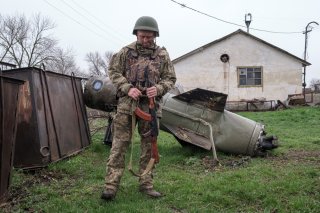As Russia Retreats East, Pentagon Warns of Missile Risk to Kyiv
Russia is in possession of ballistic and cruise missiles capable of traveling several hundred miles from distances well outside of Kyiv, and Russia’s fourth-generation aircraft could strike the capital as well.
As Russian forces withdraw from areas surrounding Kyiv and concentrate their power in the eastern region of Donbas, the Pentagon has been making clear that Ukraine’s capital city is still very much “at risk.”
“Russia still has the capability to strike Kyiv. I mean, even as we started to see their troops retreat from Kyiv, and Chernihiv from the north, I said many times, that we do not believe that Kyiv was no longer under threat, particularly from airstrikes,” Pentagon spokesman John Kirby told reporters April 14, according to a Pentagon transcript.
Certainly, Russia is in possession of ballistic and cruise missiles capable of traveling several hundred miles from distances well outside of Kyiv, and Russia’s fourth-generation aircraft could strike the capital as well. However, it still remains unclear whether Russia has established any kind of air superiority, even in some kind of regional capacity. A big surprise throughout the course of the war thus far has been Ukraine’s ability to contest the air with its own aircraft and air defenses. While many specifics are not available, Ukraine’s performance against Russian aircraft seems to suggest that the country is receiving effective anti-aircraft weapons, as Ukraine is reported to operate old Soviet-era air defenses. The West has also endeavored to give Ukraine Russian-built S-300s, and Kirby has said that the Russian Air Force appears to be “risk averse,” meaning they are less willing to fly into firing range of Ukrainian air defenses.
Nonetheless, Ukraine is still under serious threat from Russian ballistic missiles. Not long ago, the Pentagon reported that Russia was firing short-and-intermediate range ballistic missiles into Ukraine, weapons which can easily travel several hundred miles. Ukraine is very vulnerable to these kinds of attacks as the country does not have enough ballistic missile defenses or interceptors to knock incoming Russian missiles out of the sky. While the Armed Forces of Ukraine do have shoulder-fired weapons such as Stingers (which have proven to be extremely effective against helicopters, drones and low flying threats), these are unable to stop an incoming ballistic missile.
There has been some interest in sending U.S. Patriot missile batteries into Ukraine, however, the Pentagon has been clear that it would require U.S. personnel on the ground in Ukraine to operate them. This has been forcefully ruled out thus far. Further, these are concerns that Russia might use some of its precision-guided, long-range weapons to attack additional government buildings in Kyiv, including locations where President Volodymyr Zelenskyy may be located. These weapons present a very serious threat as they are going up against an underequipped Ukrainian military.
Russian convoys, armored vehicles, and advancing infantry have proven to be extremely vulnerable to Ukrainian defenders, as they can be ambushed with anti-armor weapons in hit-and-run attacks. Incoming ballistic missiles, however, are difficult to intercept without advanced radar systems and interceptors of some kind, such as U.S. Patriot batteries.
“...We said that many times in the early stages of this retreat and this repositioning of Russian troops. The Russians still have long-range air strike capability available to them. Whether it's through missiles or from air-launched cruise missiles, they -- I'm sorry, ballistic missiles or air-launched cruise missiles,” Kirby said.
Kris Osborn is the Defense Editor for the National Interest. Osborn previously served at the Pentagon as a Highly Qualified Expert with the Office of the Assistant Secretary of the Army—Acquisition, Logistics & Technology. Osborn has also worked as an anchor and on-air military specialist at national TV networks. He has appeared as a guest military expert on Fox News, MSNBC, The Military Channel, and The History Channel. He also has a Master’s Degree in Comparative Literature from Columbia University.
Image: Reuters.

